Home | Category: Islam and the Qur’an / Islam, Muslims, God and Religion
MUSLIMS
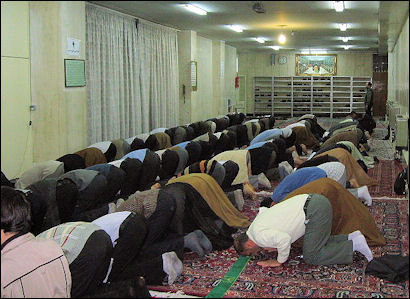
Salat Sajdah in Marashi library There are no formal rituals or ceremonies, such as baptism, in becoming a Muslim. To become a Muslim, a person simply has to recite the Shahadah, or Declaration of Faith, in front of two witnesses. This declaration consists of the words "Ashahadu an la ilaha ill Allah wa ashahadu ann Muhammadar Rasulullah," or "I declare there is no god except God, and I declare that Muhammad is the Messenger of God." [Source: Encyclopedia.com]
Submission is an import part of the definition of Muslim. one of which goes "those who have achieved peace and security by forming an allegiance with and surrendering to God." Muslims are expected to submit to Allah and the divinely-revealed laws of in the Qur’an, Islam’s holy book. These laws cover a wide range of activities. Islam is monotheistic religion like Judaism and Christianity. The foundation of the Islamic faith is the belief that: "There is no God but Allah, and Muhammad is his prophet." Muslims refer to members of Islam, Christianity and Judaism as “People of Book” because they revere their religious texts. Islam, Judaism and Christianity have many similarities and hold many of the same religious figures in high regarded. These three religions are historical religions, a concept quite alien to Buddhism and Hinduism.
While Muslims share certain core beliefs, there are many interpretations and cultural practices of Islam as well in places where Islam is practiced, thus there is a lot of diversity within the Muslim world and Muslims can vary a great from individual to individual. There are the two major branches of Islam—Sunni (approximately 85 percent of the Muslim community) and Shiite (Shias, 15 percent). Beyond these there are many theological and legal schools, as well as the diversity of thought and practice illustrated by Sufism (Islamic mysticism). [Source: John L. Esposito “Worldmark Encyclopedia of Religious Practices”, 2000s, Encyclopedia.com]
Websites and Resources: Islam IslamOnline islamonline.net ; Institute for Social Policy and Understanding ispu.org; Islam.com islam.com ; Islamic City islamicity.com ; BBC article bbc.co.uk/religion/religions/islam ; University of Southern California Compendium of Muslim Texts web.archive.org ; Encyclopædia Britannica article on Islam britannica.com ; Islam at Project Gutenberg gutenberg.org ; Muslims: PBS Frontline documentary pbs.org frontline
RECOMMENDED BOOKS:
“Muslims of the World: Portraits and Stories of Hope, Survival, Loss, and Love” by Sajjad Shah , Iman Mahoui, et al. Amazon.com ;
“A History of the Muslim World: From Its Origins to the Dawn of Modernity”
by Michael A. Cook, Ric Jerrom, et al. Amazon.com ;
“Beyond Belief: Islamic Excursions Among the Converted People” by V.S. Naipul (1998) Amazon.com ;
“Islam Explained: A Short Introduction to History, Teachings, and Culture” by Ahmad Rashid Salim Amazon.com ;
“No God but God” by Reza Aslan Amazon.com ;
“Welcome to Islam: A Step-by-Step Guide for New Muslims” by Mustafa Umar Amazon.com ;
“The New Muslim's Field Guide” by Theresa Corbin, Kaighla Um Dayo Amazon.com ;
“Islam, a Short History “ by Karen Armstrong Amazon.com ;
”History of Arab People” by Albert Hourani(1991) Amazon.com ;
“Muhammad: A Prophet for Our Time” by Karen Armstrong Amazon.com ;
“The Messenger: The Meanings of the Life of Muhammad” by Tarqi Ramadan Amazon.com ;
“The Holy Quran” Arabic Text English Translation (English and Arabic Edition) Leather Bound
Amazon.com ;
“The Holy Qur'an with English Translation and Commentary” by Maulana Muhammad Ali Amazon.com
”Muslim” Versus "Moslem" and “Islamic”

Muslim pilgrims doing the Hajj
The term "Muslim" comes from the Arabic phrase "bianna musliman", which roughly means "submitted ourselves to God." The terms is used to describe a practitioner of Islam and is often used as an adjective to describe things related to Islam such as Muslim theology, The adjective Islamic is preferable in social or cultural contexts, such as Islamic law and Islamic architecture. Many people use the terms interchangeably.
These days "Muslim" is the preferred spelling in English. In the 20th century the preferred spelling in English was "Moslem", but this has now fallen into disuse. A female adherent to Islam is technically a muslima/ The plural form of Muslim in Arabic is muslimūn (مسلمون) or muslimīn (مسلمين), and its feminine equivalent is muslimāt (مسلمات). [Source: Wikipedia]
Glenn Meissner — a practicing and devout Muslim — posted on Quora.com in 2017: Muslim/Muslima mean in Arabic someone who has submitted themselves (to Allah). Islam simply means submission. Most of the time I use the term Muslim to denote a person, and Islam to denote the religion a Muslim follows as revealed by Prophet Muhammad (pbuh). In the English language using the adjective Islamic therefore denotes something that has been guided or shaped around the teachings of Prophet Muhammad (pbuh). For example "Islamic Law" "Islamic Country" etc. Whereas if you where talking about a person, or people, you would say Muslim/s.
In “What Is The Difference Between “Muslim” And “Islamic”?” , Ahmed E. Souaiaia wrote in in Medium: The word Muslim [مسلم] is Arabic in form and function. It is a descriptive active participle [ism fā`il] derived from the verb, aslama. This Arabic form connotes agency being embedded within the description. Therefore, it describes a person or a group of persons who consciously follow or adhere to the religion called Islam [الإسلام]. Since it is an Arabic term in origin, form, and meaning, the word should be used in the context appropriate in that language. The word Muslim is never used in Arabic to describe a thing, and idea, or an event. Rather, it is used to describe human beings who believe in and practice Islamic teachings. It is therefore incorrect to say Muslim architecture, Muslim music, Muslim art, Muslim thought, etc. [Source: Ahmed E. Souaiaia, University of Iowa, July 14, 2021
The word Islamic is an adjective that takes its meaning from the fact that it reflects some characteristics of Islam, in varying degrees. It can be used in two contexts. First, the adjective Islamic describes things, ideas, and events whose origins are in Islam. In this sense, it complements the adjective, Muslim, which describes persons. Second, the word Islamiccan be used to describe things that are present in Islamic societies and cultures, even if their origins are not rooted in Islam or produced by Muslim peoples. The Islamic civilization came to existence because Muslims’ ideas and ideals were dominant, but they were not the sole engines that produced its rich legacy. Therefore, the adjective Islamic was broadly used to account for all the productions of this civilization, authored by all–Muslims and non-Muslims.
It must be noted that it is possible to apply the adjective Islamic to a person or group of persons, but such use must be deliberate. For example, some people often ask the question, “are you Islamic?”, Instead of, “are you Muslim?”. This is a common mistake. However, it is possible that the questioner used Islamic as it is used in Arabic, islamiyy [إسلاميّ], in which case it would mean Islamist (discussed below). Such use would be appropriate, though unlikely to be the intended meaning.
To illustrate the different usages, let’s consider the phrases Islamic architecture and Muslim architecture. The phrase Islamic architecture refers to architecture that is broadly influenced, limited, inspired, informed by Islamic values, even if it is produced by non-Muslim persons. Islamic architecture might consist of purely Islam-inspired elements, but it might also consist of elements that are not inspired and influenced by Islam or Muslim architects. By contrast, the term Muslim architecture is attributive, not descriptive. It refers to architecture created by Muslim persons. Where Islamic architecture is a broad descriptive term, accurate use of the term Muslim architecture requires a specific context.
With this distinction in mind, it becomes clear that the adjective Muslim is exclusive whereas the adjective Islamic is inclusive. Not all Islamic things are produced by Muslims, but Muslim-produced things must be things produced by individuals who are Muslim. A musician who is not Muslim may produce an Islamic song. A Muslim band, meaning a band whose members are all Muslim, may produce and play songs that have no roots in Islam or in Muslim communities of any era of any background. Though in both examples Islam is present through the expressions, experiences, and backgrounds of the persons involved, that link is insufficient to merge the two terminologies.
Muslims — the World’s Second Largest Religious Group
With about 2 billion followers, Islam is the world's second largest religion after Christianity. As of 2020, according to Wikipedia, there were 1.8 billion to 1.9 billion or more Muslim, and they made up 25 percent of the world population are Muslims. Pew Research estimated Muslim number would be around 2.2 billion in 2030 and 2.8 billion in 2050 or 30 percent of world population.
In 2012, a Washington-based Pew Forum study estimated there were 2.2 billion Christian adherents or 31.5 percent of the world’s population, and about 1.8 billion Muslims around the world, or 24 percent of the global population. The overwhelming majority of Muslims (87-90 percent) are Sunnis, about 10-13 percent are Shia (Shiite) Muslims,” the study said. [Source: Tom Heneghan, Reuters, December 18, 2012 |*|]
According to a Pew report issued in October 2009 the global Muslim population had reached 1.57 billion while Christianity, had approximately 2.1 billion to 2.2 billion followers (about one third of humanity). Primarily because of high birth rates in Muslim countries, Islam is the world fast growing religion in terms of total numbers.
World religions: 1) Christianity (32 percent); 2) Islam (24 percent); 3) non-religious and atheist (13 percent); 4) Hinduism (13 percent); 5) Chinese folk religions (6 percent); 6) Buddhist (6 percent); and 7) Other (6 percent). Only about 20 percent of the world’s Muslims are Arabs (who live in the Middle East and North Africa). The largest populations of Muslims are in Indonesia, India, Pakistan, Bangladesh and Nigeria. There are also large numbers in the Philippines, China, Malaysia and Central Asia.
See Separate Article: MUSLIM POPULATION AND DEMOGRAPHICS africame.factsanddetails.com
Islam
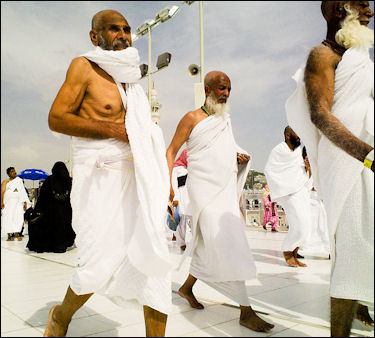
Hajj Pilgrims on the roof of the Grand Mosque in Mecca Islam is a monotheistic religion. A believer is a Muslim, literally, "one who submits to God." Muslims believe that Allah (Arabic for God) gave revelations through the angel Gabriel to the Prophet Muhammad (Mohammed, A.D. 570-632 ), a native of the Arabian Peninsula city of Mecca. [Source: Library of Congress]
Islam was once called Mohammedism by Europeans, because it formally began during the lifetime of Muhammad. Calling it this was misleading at best in that Muhammad saw himself as only a messenger of God and the worship of Muhammad as a religious figure is frowned upon in Islam.
The world "Islam" is derived from the same root word “salam” which means both "peace" and "submission” or more exactly “a state of peace and security formed by making an allegiance with and surrendering to God." Muslims, or Moslems, are "those who submit" or more correctly "those who have achieved peace and security by forming an allegiance with and surrendering to God." Muslims are expected to submit to Allah and the divinely-revealed laws of in the Qur’an, Islam’s holy book. These laws cover a wide range of activities. Islam is monotheistic religion like Judaism and Christianity.
The foundation of the Islamic faith is the belief that: "There is no God but Allah, and Muhammad is his prophet." Muslims refer to members of all three religions as “People of Book” because they revere their religious texts. Islam, Judaism and Christianity have many similarities and hold many of the same religious figures in high regarded. These three religions are historical religions, a concept quite alien to Buddhism and Hinduism.
“The Five Pillars of Islam are the five obligations that every Muslim must satisfy in order to live a good and responsible life according to Islam. The Five Pillars consist of: 1) Shahadah: sincerely reciting the Muslim profession of faith; 2) Salat: performing ritual prayers in the proper way five times each day; 3) Zakat: paying an alms (or charity) tax to benefit the poor and the needy; 4) Sawm: fasting during the month of Ramadan; 5) Hajj: pilgrimage to Mecca
See Separate Article: ISLAM: BASICS, MUSLIMS, PILLARS africame.factsanddetails.com
Where Muslims Live
About 40 percent of Muslims are from South and Southeast Asia. About 30 percent live in the Middle East (including Turkey and Iran), about 25 percent live in Africa (including Egypt and North Africa). About 4 percent are in Europe and the former Soviet Union, and 1 percent are in North and South America. The Muslim world has geopolitcal importance because much of the world's oil reserves lie under land in Muslim countries. In addition the mostly Muslim Middle East lies were Asia, Africa and Europe all come together.
According to Pew Research Center, Although many countries in the Middle East-North Africa region, where the religion originated in the seventh century, are heavily Muslim, the region is home to only about 20 percent of the world’s Muslims. A majority of the Muslims globally (62 percent) live in the Asia-Pacific region, including large populations in Indonesia, India, Pakistan, Bangladesh, Iran and Turkey. Indonesia is currently the country with the world’s largest Muslim population.[Source: Michael Lipka, Pew Research Center, August 9, 2017]
Percentage of the total population in a region that consider themselves Muslim,: A) 91 percent in the Middle East-North Africa; B) 89 percent in Central Asia; C) 40 percent in Southeast Asia; D) 31 percent in South Asia: E) 30 percent in Sub-Saharan Africa; F) 25 percent in Asia; G) 1.4 percent in Oceania: H) 6 percent in Europe, and I) 1 percent in the Americas. [Source: Wikipedia]
See Separate Article: MUSLIM POPULATION AND DEMOGRAPHICS africame.factsanddetails.com

Muslim Identity
Many Muslims view themselves as Muslims first and citizens of a nation second. They are more likely to see themselves as a religious group divided by nations rather than a citizen of a nation comprised of different groups. One reason for this is that nations are relatively new creations for Muslims largely imposed on them by European colonial powers.
The words that Arabs used to describe many countries in the Middle East are different from those used in the West partly because Arabs do no link ethnicity and territorial identity the same way that Westerners do. The Caliph Omar, the second successor to Muhammad, reportedly said: “Learn your genealogy, and do not be like the local peasants who, when they are asked reply: “I am from such-and-such places.”
In the early years of Islam, Muslims were unified in a single state under one leader. Even after regional and religious communities broke up, Muslims continued to honor one leader, the caliph, and shared the belief that Muslims would be united once again. Throughout their history, Muslims have tended to identify themselves as Muslims first as Arabs, Persians, Turks and other ethnic groups second. Some ethnic groups’such as Bedouins and other nomads — were not necessarily associated with a particular geographical area. Non-Muslims were often called kafirs (infidels).
Diversity within the Muslim Community
There is great diversity within the Muslim community. Muslims speak hundreds of different languages and have a wide range of customs. These days Muslim identity means something different than it used to. When they identify themselves as Muslims, many go to great lengths to point out they are moderate Muslims and that they do not support or sympathize with terrorists, Islamists or Muslim extremists.
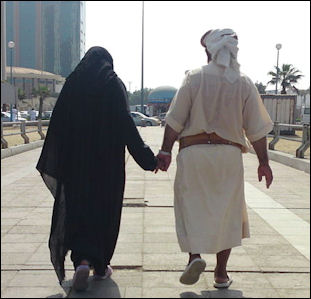
According to Pew: Like any religious group, the religious beliefs and practices of Muslims vary depending on many factors, including where in the world they live. But Muslims around the world are almost universally united by a belief in one God and the Prophet Muhammad, and the practice of certain religious rituals, such as fasting during Ramadan, is widespread. [Source: Michael Lipka, Pew Research Center, August 9, 2017]
In other areas, however, there is less unity. For instance, a Pew Research Center survey of Muslims in 39 countries asked Muslims whether they want sharia law, a legal code based on the Quran and other Islamic scripture, to be the official law of the land in their country. Responses on this question vary widely. Nearly all Muslims in Afghanistan (99 percent) and most in Iraq (91 percent) and Pakistan (84 percent) support sharia law as official law. But in some other countries, especially in Eastern Europe and Central Asia — including Turkey (12 percent), Kazakhstan (10 percent) and Azerbaijan (8 percent) — relatively few favor the implementation of sharia law.
Views by Muslims
According to Pew Research Center, about 54 percent of Muslims worldwide say there is no tension between being religiously devout and living in a modern society. About 18 percent say that many religions can lead to eternal salvation and 95 percent say that all or most of their close friends are Muslim in the 39 countries surveyed. About 54 percent of Muslims globally say there generally is not a conflict between science and religion and 53 percent believe in evolution. About 71 percent say that suicide bombing and similar acts targeting civilians are never justified. [Source: Pew Research Center, April 30, 2013]
How do people in the Muslim world and people in the West associate with each other? According to Pew: A 2011 survey asked about characteristics Westerners and Muslims may associate with one another. Across the seven Muslim-majority countries and territories surveyed, a median of 68 percent of Muslims said they view Westerners as selfish. Considerable shares also called Westerners other negative adjectives, including violent (median of 66 percent), greedy (64 percent) and immoral (61 percent), while fewer attributed positive characteristics like “respectful of women” (44 percent), honest (33 percent) and tolerant (31 percent) to Westerners. [Source: Michael Lipka, Pew Research Center, August 9, 2017]
Westerners’ views of Muslims were more mixed. A median of 50 percent across four Western European countries, the U.S. and Russia called Muslims violent and a median of 58 percent called them “fanatical,” but fewer used negative words like greedy, immoral or selfish. A median of just 22 percent of Westerners said Muslims are respectful of women, but far more said Muslims are honest (median of 51 percent) and generous (41 percent).
Arab World, Muslim World and Religion
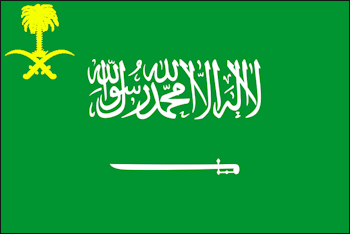
Shahada on Royal flag of Saudi Arabia The Arab world describes the countries in the Middle East and North Africa where the majority people speak Arabic and belong to the Arab ethnic group. It excludes Israel, Turkey and Iran, which are dominated, respectively, by Jews, Turks and Persians, but includes the Maghreb countries of Morocco, Algeria, and Tunisia, which are sometimes not regarded as part of the Middle East.
The Arab world is made up of nineteen countries: Mauritania, Morocco, Algeria, Tunisia, Libya, Chad, Egypt, Sudan, Lebanon, Syria, Jordan, Saudi Arabia, Kuwait, Bahrain, the United Arab Emirates, Qatar, Yemen, Oman and Iraq. There are also significant Arab populations in Iran, Turkey, East Africa, South America, Europe, North America, Southeast Asia and Australia.
Arab was originally used to describe the desert people of the Arabian peninsula. When they spread out during the Muslim conquest, the term began to describe a larger group of people. The Muslim world refers to the countries whose populations are made up predominately of Muslims. These include the countries of the Middle East, the Maghreb countries plus non-Arab countries with majority Muslim populations such as Indonesia, Malaysia, Pakistan, Tajikistan, Uzbekistan, Kyrgyzstan, Turkmenistan, Kazakhstan, Djibouti, Somalia, Niger, Senegal. Some Sub-Saharan African counties, particularly in West Africa and to a lesser extent East Africa, have large numbers of Muslims.
Religion is arguably the most important defining force of communal identity in the Middle East, with Islam far and away being the predominate religion. In the Middle East religion has less to do with ritual than identity. If a person is born into a Muslim family they will forever be identified as a Muslim and most likely marry a Muslim regardless of how religious they are. The same is true for Christians and Jews.
Most Arabs are Muslims but most Muslims are non-Arabs. About about 92 percent of Arabs are Muslim. The remainder are mostly Christians and Druze. Most Muslim Arabs are Sunni Muslim. Others are Shiites (Ithna Ashari and Ismali), Alawi, and Zaidi.
On traditional Arab daily-life-culture, the Encyclopedia of World Cultures says: “Arab villagers follow a mixture of Islamic folk beliefs and rituals. Religion provides explanations for many unknown and uncontrollable events in their lives. Gods will dictates the direction of life and provides divine authority for action. Religion confirms changes in social status, for example, at circumcisions and marriages. It provides hope for a better life after death. Religion festivals...break the monotony of village life.”
Islam — The World’s Fastest-Growing Religion
Muslims are the fastest-growing religious group in the world. The high growth rates is mainly attributable to high fertility rates and the high incidence of conversion. The growth and regional migration of Muslims have brought Muslims and the Islamic faith to the forefront of the political debate in many countries.[Source: Michael Lipka, Pew Research Center, August 9, 2017]
Pew Research estimated Muslim number would be around 2.2 billion in 2030 and 2.8 billion in 2050 or 30 percent of world population. Pew projects that India will have that distinction by the year 2050 (while remaining a majority-Hindu country), with more than 300 million Muslims. The Muslim population in Europe also is growing; we project 10 percent of all Europeans will be Muslims by 2050. [Source: Michael Lipka, Pew Research Center, August 9, 2017]
Michael Lipka of Pew Research Center writes: There are two major factors behind the rapid projected growth of Islam, and both involve simple demographics. For one, Muslims have more children than members of other religious groups. Around the world, each Muslim woman has an average of 2.9 children, compared with 2.2 for all other groups combined.
Muslims are also the youngest (median age of 24 years old in 2015) of all major religious groups, seven years younger than the median age of non-Muslims. As a result, a larger share of Muslims already are, or will soon be, at the point in their lives when they begin having children. This, combined with high fertility rates, will fuel Muslim population growth. While it does not change the global population, migration is helping to increase the Muslim population in some regions, including North America and Europe.
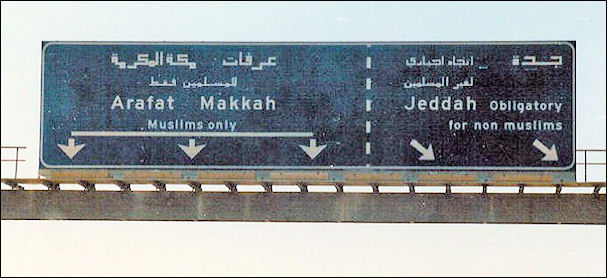
Christian Bypass near Mecca
Image Sources: Wikimedia Commons
Text Sources: Pew Research Center, “World Religions” edited by Geoffrey Parrinder (Facts on File Publications, New York); “ Arab News, Jeddah; “Islam, a Short History” by Karen Armstrong; “A History of the Arab Peoples” by Albert Hourani (Faber and Faber, 1991); “Encyclopedia of the World Cultures” edited by David Levinson (G.K. Hall & Company, New York, 1994). “Encyclopedia of the World’s Religions” edited by R.C. Zaehner (Barnes & Noble Books, 1959); National Geographic, BBC, New York Times, Washington Post, Los Angeles Times, Al Jazeera, The New Yorker, Time, Reuters, Associated Press, AFP, Library of Congressand various books and other publications.
Last updated March 2024
